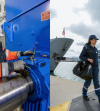The 4th edition of Méditerranée du Futur, an event organized by the Région Sud Provence-Alpes Côte d'Azur was 100% digital this year. At the heart of the debates was a theme that particularly resonates with current events : "From plague to covid, 300 years of resistance to pandemics in the Mediterranean". Some sixty experts of 43 nationalities exchanged views on the fight against pandemics and how to improve cooperation between the two shores of the Mediterranean. Ecomnews Med was able to follow for you this day of debates. Here is what you can take away from it.
At the opening of the fourth edition of Méditerranée du Futur, the international event organized by the Southern Region, Renaud Muselier, its President explained: “The Mediterranean needs spaces for dialogue that never fade away. The Mediterranean needs constant solidarity between its territories. The Mediterranean needs to talk about what unites it rather than its divisions. »
The ambition of the President of the Southern Region is to generate a collective dynamic aimed at making the region the flagship of France’s Mediterranean policy. The “Mediterranean of the Future” event brings together once a year in Marseilles all the Mediterranean partners in order to share best practices around specific issues and common challenges.
After the climate, youth and investment on both shores, this year’s theme was at the heart of the news: “From plague to covid, 300 years of resistance to pandemics in the Mediterranean”.
“The Mediterranean is the theater of all resistance. We have hope for the future: the peoples of the Mediterranean have always recovered from the diseases that have struck them,” assured Renaud Muselier.
Marseille has been marked by epidemics throughout its history. As a major Mediterranean port, human and commercial exchanges have made it the entry point for several of the major epidemics that have hit Western Europe.
During the day, some sixty experts of 43 nationalities were able to exchange views on the fight against the disease. If the Southern Region has, from the very beginning of the epidemic linked to the Covid 19 deployed all its efforts and means to mitigate the effects of this crisis on the regional territory, it remains convinced that the reflection must be carried out at another level, Mediterranean or even global.
“We must believe in the importance of dialogue, international solidarity and partnerships to strengthen international cooperation mechanisms and ensure a sustainable future for all” explained HSH Prince Albert II of Monaco.
For Stella Kyriakides, European Commissioner for Health and Food Safety: “COVID19 has challenged us all. But this crisis has also brought out the best in humanity. Neighbors support each other. Health professionals and frontline workers are making incredible sacrifices and global cooperation has increased. It has shown that the best weapons are science, solidarity and multilateralism. »
“This crisis shows the need to rethink our economic systems and to foster trade between Mediterranean countries. It is a question of creating regional supply chains” explained Nasser Kamel Secretary General of the Union for the Mediterranean.
Dr. Tedros Adhanom Ghebreyesus, Director General of WHO also intervened: “Strong actions are needed to ensure that we are all better equipped for future crises: global health cooperation, strengthening of health systems and equitable distribution of medicines and vaccines. »
The famous Marseille professor Didier Raoult had the opportunity to share his analysis on the management of the Covid 19 epidemic: “In Europe, the degree of unpreparedness is frightening! “he explained. “The fight against epidemics is a regalian domain. The fight against such an epidemic is not led from an office in Brussels or Geneva, but from the field.
According to him, “it is the pharmaceutical industry that leads the therapeutics in the world. We have an absolutely considerable heritage of chemical molecules, many of which are of natural origin and have multiple actions, which have not been evaluated and which cannot be evaluated because they are not profitable”.









